Choosing a platform to run your online store is one of the most critical steps when starting your eCommerce business. Along your way, you’ll probably face the following decision: Magento vs Shopify.
Shopify and Magento are two leading eCommerce platforms offering unique opportunities for businesses. While Shopify is a SaaS solution, Magneto is an open-source platform requiring some development work. No wonder it may be challenging to choose between these two options.
GenovaWebArt will ease your doubts by providing a detailed Magento vs Shopify comparison. We’ll tell you about the main features of these eCommerce platforms and outline the core differences between them. As a reliable Shopify development vendor with numerous thriving projects like Winky Lux and Ten Thousand, we can share valuable insights into this topic.

Shopify vs Magento: A Quick Comparison
As already mentioned, Magento is an open-source eCommerce platform. You can download and install it for free, yet that’s where the potential challenges may occur. You need technical knowledge and skills to launch your online store. In contrast, it’s much easier to kick off with Shopify.
So let the comparison begin! Here is the core difference between Magento and Shopify on the particular parameters.
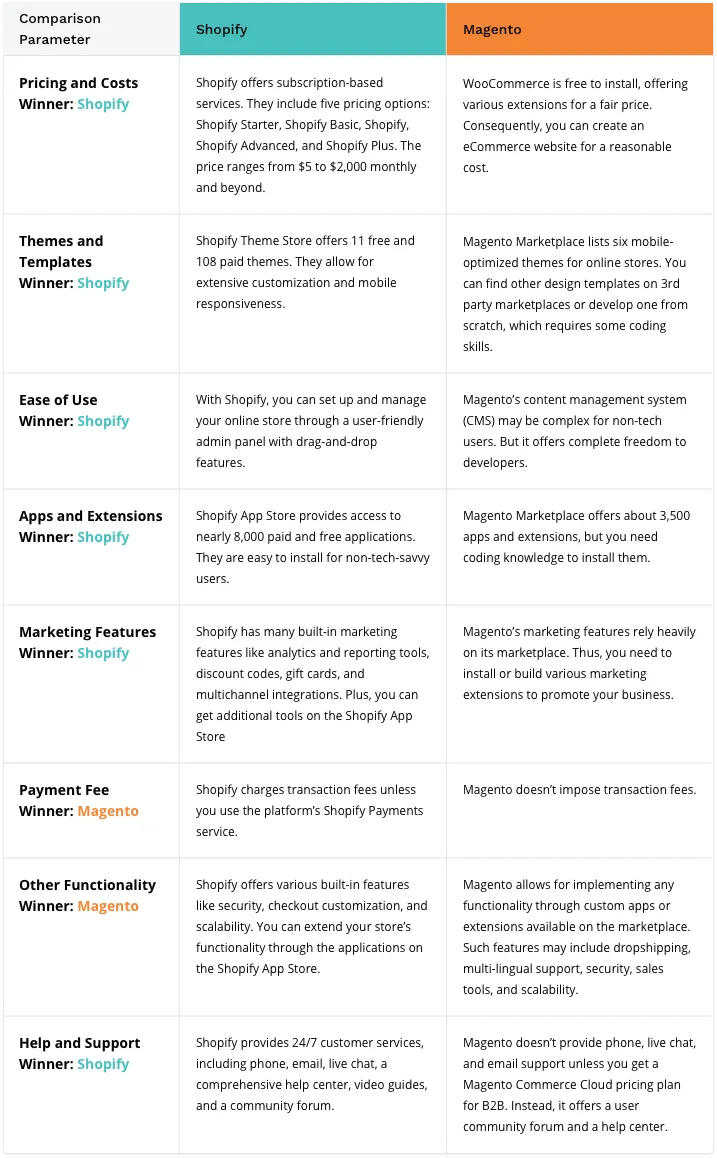
As you can see, Shopify is a more user-centered platform that outperforms Magento in many parameters. It offers numerous built-in features and is easy to use for non-tech individuals. Magento, on the other hand, suits businesses that require a completely custom solution, as this open-source platform allows the implementation of customized code.
If you’re looking for other eCommerce platform alternatives, read our guide comparing Shopify vs WooCommerce.
Magento vs Shopify: Market Share and Statistics
If you’re wondering which is better, Magento or Shopify, let’s consider some statistics on these eCommerce platforms.
Following the data from BuiltWith, Shopify is one of the most widely used eCommerce platforms, with a 22% global market share. As for Magento, only 0.36% of eCommerce websites worldwide use this technology.
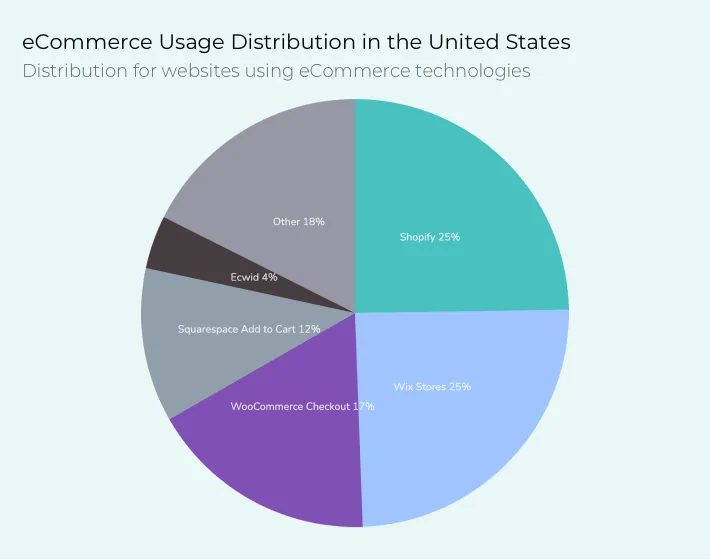
Now, let’s sum up the information above.
- Over 4.5 million online stores on Shopify
- Almost 170 thousand online stores on Magento
The US stats on eCommerce platform market share claim Shopify is even more popular, with about 25% of online stores built with this solution. In contrast, Magneto stats are less impressive: only 0.43% of US eCommerce websites use this platform.
We also considered the Google Trends data, a decent indicator of the eCommerce platforms’ popularity. Here’s what we discovered:
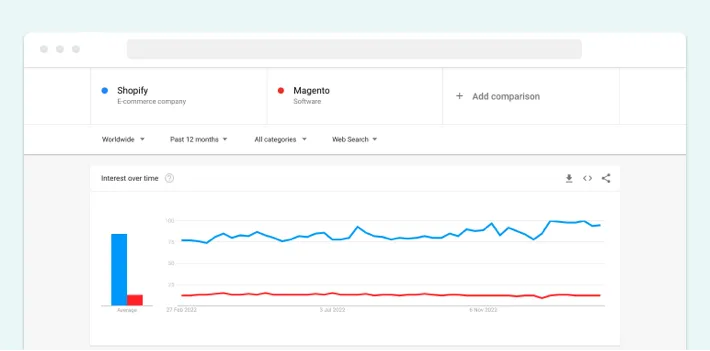
Google Trends shows that people tend to search for Shopify much more often. However, many still consider building their online stores with Magento.
Magento vs Shopify: Pros and Cons
How does Magento compare to Shopify in terms of the benefits and drawbacks of these platforms? Check out our core considerations in the table below:
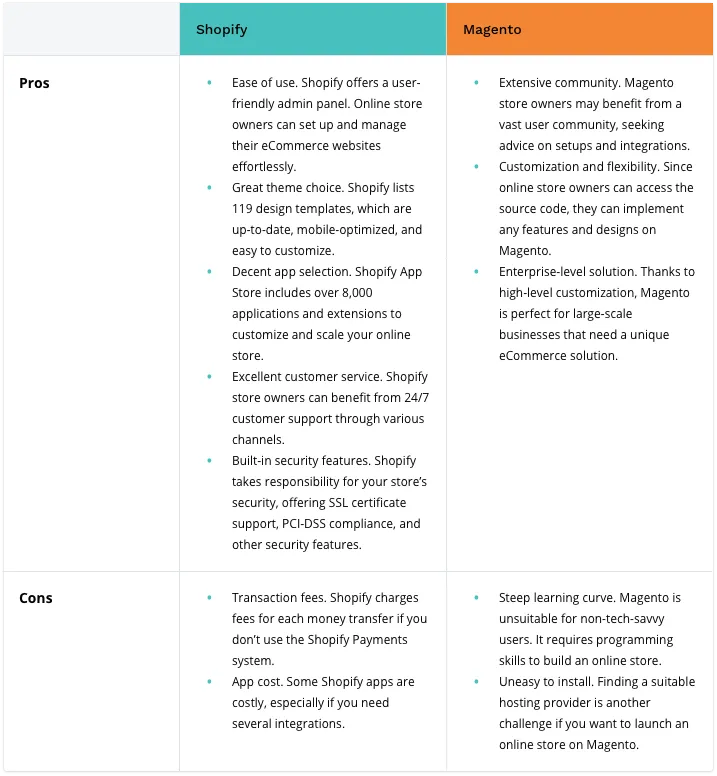
All in all, Shopify excels over Magento in many ways. It is user-friendly, with numerous helpful features included in the subscription. Nevertheless, Magento is a decent enterprise-level solution for businesses ready to invest in custom development.
Shopify or Magento: A Detailed Comparison
Now that you know the platforms’ pros and cons, you can move on to our detailed Shopify and Magento comparison. We’ll discuss the core platforms’ characteristics mentioned earlier in greater detail.
1. Pricing and Costs
When choosing an eCommerce platform, the budget you set for your online store creation is a critical factor to consider. So is Magento better than Shopify in terms of pricing?
Magento is a free-to-download open-source platform. While looking attractive, it may involve some hidden expenses, including the following ones:
- Domain name — about $1 monthly
- Hosting — about $400 monthly
- SEO and marketing tools — about $2,000 monthly
- Development and maintenance — about $7,000 monthly
Working with Magento also involves one-off expenses:
- Themes — up to $499
- Extensions — nearly $5,000
Creating and maintaining your store doesn’t seem like a bargain when you add all these expenses. From this perspective, Shopify is a more reasonable solution, offering the following monthly subscriptions:
- Shopify Starter — $5 monthly for social media sales
- Shopify Basic — $32 monthly for an online store builder with basic reports and two staff accounts
- Shopify — $92 monthly for an online store builder with professional reports and five staff accounts
- Shopify Advanced — $399 monthly for an online store builder with custom reports and fifteen staff accounts
- Shopify Plus — from $2,000 monthly for enterprise-grade online stores with extensive functionality
Shopify Plus and Magento Enterprise comparison in terms of pricing comes with a slight difference: Magento enterprise-level version starts at $1,800 monthly.

These Shopify pricing plans include the essential features to run your online store efficiently. However, you may need to spend more when purchasing an app to implement some extra features. But still, Shopify prevails in terms of pricing.
2. Themes and Templates
Another factor to consider is your eCommerce website design. You can achieve a decent look and feel for your online store and attract new customers through proper theme implementation.
Speaking of design capabilities, Shopify is the preferable option. And here’s why Shopify is better than Magento. This platform lists 119 modern and responsive themes and offers convenient drag-and-drop features for their customization. You can achieve the desired look of your eCommerce website in no time.
You may also use the free design templates or buy a paid one for $180 to $350. And if you need a unique solution for your Shopify store, you may turn to an experienced Shopify development partner like GenovaWebArt. We can provide any Shopify-related services tailored to your individual needs.

Magento offers a limited number of official themes. You can only select among the six design templates priced from $0 to $499. Alternatively, you may engage designers to create a custom theme or pick a design template on a third-party marketplace.
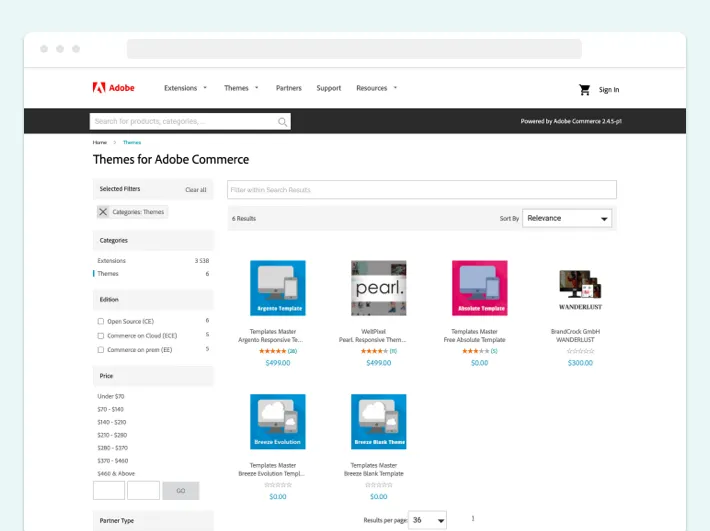
3. Ease of Use
Ease of use is the main difference between Shopify and Magento. And again, Shopify has an edge in this aspect. Most business owners and merchants don’t have experience in design and development. That is why Shopify's significant advantage is the opportunity to create an online store from scratch without technical skills.
On the other hand, Magento enables online store owners to manage content without tech knowledge. But if you want to integrate some extra features or extensions, you will only do it with coding skills.
4. Apps and Extensions
Adding functionality to your online store depends heavily on various apps and extensions. Both Shopify and Magento provide such solutions on their dedicated marketplaces.
Speaking of Shopify, you can access about 8,000 free and paid applications. Those include tools for shipping, store design, online store management, sales, marketing, conversion, and many more. You can install an application with a few simple clicks. Just download the app - and it will appear in your Shopify admin.
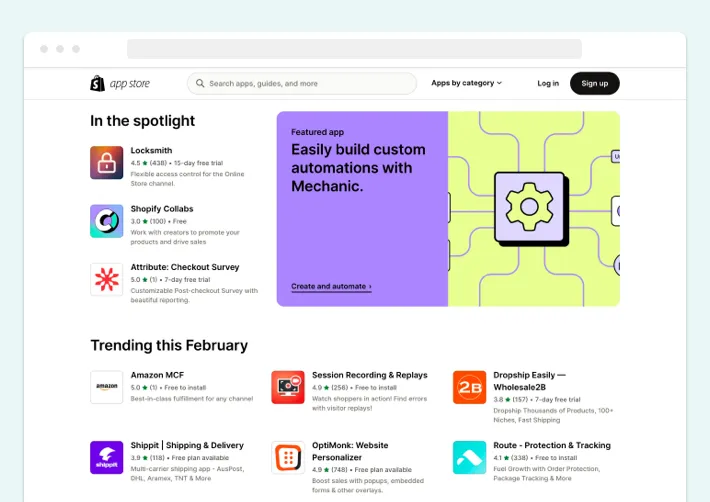
Magento also provides a decent amount of paid and free extensions (namely about 3,500 apps). However, you will need coding experience to add them to your online store. Thus, Shopify outperforms Magento again.
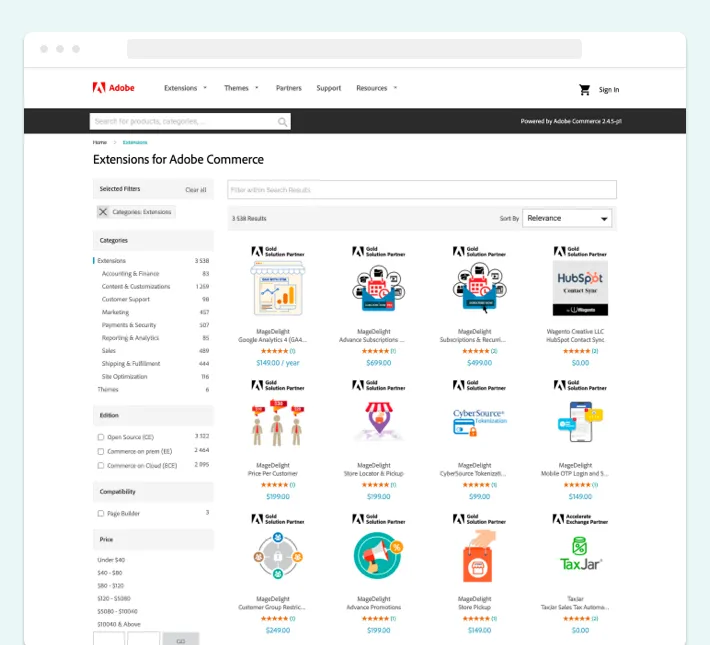
5. Marketing Features
Marketing is your way to promote your business, draw more customers, and sell more products. Shopify and Magento provide those capabilities, so let’s discuss them in greater depth.
Magento allows for advanced SEO optimization. In particular, you can customize URLs and change your eCommerce website structure. Shopify also offers SEO optimization features but has some limitations due to the hierarchical URL structure.
Speaking of other marketing capabilities, Shopify has more to offer. This platform enables many built-in features, including discount codes, gift cards, loyalty programs, integration with social media and other channels, email marketing, and analytics tools. To access most of those functions in Magento, you should use apps and extensions.
6. Payment Fee
Magento outperforms Shopify regarding payment options and transaction fees. This platform supports over 300 payment gateways, including PayPal and Braintree. It works well for international businesses and makes the shopping experience smoother for numerous customers worldwide. In addition, Magento doesn’t impose transaction fees, and the charges depend on the third-party payment processor.
Shopify, in turn, is compatible with about one hundred payment gateways. However, the platform charges a transaction fee if you don’t implement the native Shopify Payments service. The fees differ for every pricing plan:
- Shopify Basic — 2% per transaction
- Shopify — 1% per transaction
- Shopify Advanced — 0.5% per transaction
- Shopify Plus — 0.15% per transaction
7. Other Functionality
There are some other features you may benefit from with Shopify and Magento. Let’s see what else these platforms offer.
- Dropshipping. You can use the Dropship extension on Magento or Oberlo on Shopify to implement a dropshipping feature.
- Multi-lingual support. Magento supports various languages by default. In turn, Shopify provides apps for this purpose.
- Security. Magento requires implementing security features from scratch, while Shopify has built-in fraud detection tools, PCI compliance, and SSL certificate support.
- Sales features. Shopify offers built-in shipping and multichannel selling tools. Meanwhile, Magento ensures checkout optimization and abandoned cart recovery.
- Currency support. Magento supports over 200 currencies, while Shopify provides support for about 130.
- Scalability. Magento allows for extensive scalability if the store owners can access the code. Shopify allows for scaling your eCommerce website by integrating apps and extensions or upgrading your pricing plan.
All in all, Magento has an edge in additional functionalities implementation. Not only does it offer plenty of built-in features, but it allows for the custom development of new ones.
8. Help and Support
Shopify outperforms its numerous competitors like Magento by providing outstanding 24/7 customer support services. Those include the following:
- Phone support
- Email support
- Live chat
- Community forum
- Help center
- API documentation
- Video guides
Magento can boast a strong user community. In case you have any questions regarding extensions, setups, or failures, you can find the necessary answers on the Magento forum. On top of that, you may use the help center for more information.
If we focus on comparison between Magento Enterprise and Shopify Plus, we should point out that you can reach round-the-clock customer support in a paid Magento version for large-scale businesses. However, Shopify includes this option in all its plans, while you can’t expect Magento Open Source to provide it. Therefore, from the broad perspective of this article, Shopify seems to be a better option for small and medium businesses.
That’s it for today’s analysis of Magento and Shopify. Carefully weigh the platforms’ characteristics and decide what’s best for your business.
Choose GenovaWebArt as Your Reliable Shopify Partner
If you have read our Shopify versus Magento comparison and decided that Shopify is the best choice for your online store, then you are in the right place. GenovaWebArt is a reliable Shopify development vendor with over a decade of experience in the industry.
Our expert team helped numerous brands to achieve outstanding results by providing the following services:
- Shopify theme development and customization
- Shopify app development
- Shopify design
- Shopify migration services
- Shopify development from scratch
We deliver our services with diligence, excellent communication, and for a reasonable price. Are you still doubting between Magento vs Shopify Plus or other Shopify plans? Look at some of the best Shopify stores our team created:
Winky Lux
Winky Lux is a beauty product retailer from New York. Our team had to tackle Shopify Plus development to deliver a well-performing and scalable online store. We handled this task effortlessly and still provide ongoing support for this eCommerce website.

Ten Thousand
Ten Thousand is a US-based sportswear brand. The GenovaWebArt team had to create a minimalistic online store on Shopify Plus. We delivered a simplistic, user-friendly eCommerce website with convenient search filters and product listings. We also provide ongoing tech support for this store.

Paper Republic
Paper Republic is an Austrian brand that specializes in selling personalized leather notebooks. Our team has provided Shopify Plus development services and ongoing support for this client. We delivered a simplistic online store with a focus on powerful imagery.

Got interested? You may find plenty of other outstanding projects created by GenovaWebArt in our portfolio.
Conclusion
Choosing a perfect eCommerce platform to power your online business may be challenging. However, now that you know what is the difference between Magento and Shopify Plus, it will be much easier for you to decide.
Both Magento and Shopify are excellent options for online store development. But you should carefully study your business needs and capabilities before choosing one of those platforms. Magento is a viable solution for large companies that can leverage expert help to set up their store. Shopify, in turn, works well for businesses of various sizes and users with different tech backgrounds.
If you’ve concluded that switching to Shopify is your best choice, GenovaWebArt experts are ready to support your decision. We can provide outstanding Shopify design and development services, leveraging our many-year expertise. So feel free to contact our team for further discussion.



![8 Success Stories of Migrating to Shopify [Real Cases] - GenovaWebArt blog article, banner image 8 Success Stories of Migrating to Shopify [Real Cases] - GenovaWebArt blog article, banner image](https://genovawebart.com/hubfs/img/webp/hero-banner-blog-article-success-stories-of-migrating-to-shopify.webp)



